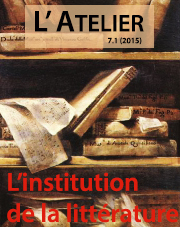Proletarian Literature, an Unidentified Literary Object
Keywords:
Littérature prolétarienne, Etats-Unis, Communisme, Marxisme, Théorie littéraire,Abstract
RESUME: A la fin des années 1920, lorsque le Comintern lance la “troisième période” et promeut la littérature prolétarienne comme arme dans le combat contre la bourgeoisie, le Parti communiste américain s’aligne sur ses directives. Néanmoins, la définition de la littérature prolétarienne donne lieu à de nombreux débats et controverses dans les revues de gauche (New Masses, Partisan Review,…) et les romans produits sous sa bannière sont souvent accusés de n’être pas assez vrais, de ne pas donner à voir le sort véritable des travailleurs. La littérature prolétarienne est ainsi en partie un produit de la critique et, après les années 1930, elle en fut souvent la victime. Les New Critics considéraient que les romans prolétariens – ou même simplement radicaux – n’étaient guère plus que des documents historiques, et ne leur accordèrent jamais de véritable valeur littéraire. Les bouleversements politiques des années 1960 et 1970, l’émergence de nouvelles disciplines universitaires (autour du genre, de la race et de la classe) permirent aux romans prolétariens de sortir de l’oubli. Ils furent analysés, parfois réédités, car ils semblaient offrir un modèle alternatif au récit politique américai majoritaire. Mais une fois encore, les analyses se concentraient principalement sur ce que ces oeuvres disaient d’une période ou d’un groupe particulier (les femmes, les Noirs, les communistes,…). Depuis le début des années 2000, cependant, de plus en plus de chercheurs ont cherché à saisir les romans prolétariens dans leur dimension narrative, pour tenter de cerner ces objets littéraires non identifiés.
ABSTRACT: At the end of the 1920s, when the Comintern launched its “third period” by promoting the rise of proletarian literature everywhere, the American Communist Party followed suit. Many debates and controversies on the definition of proletarian literature took place in radical journals (New Masses, Partisan Review,…); the novels themselves were often accused of not being “authentic” enough, of not revealing the true plight of the working class. The proletarian novel was therefore, in part, the product of theory, and after the 1930s, it was often its victim. The New Critics considered proletarian, or even radical novels to be little more than historical documents, and never deemed them worthy of literary consideration; with the political upheavals of the 1960s and 1970s and the rise of new academic trends (feminist studies, African-American studies, radical studies…), proletarian novels were exhumed from the drawers of history, sometimes republished, and analyzed, since they seemed to offer a counter-model to the American political narrative. But once again, the focus was, more often than not, on what these works said about a given period or a given group (women, Blacks, communists…) rather than on what they were as literary productions. Over the past fifteen years, however, more and more scholars have reclaimed proletarian novels as novels, trying to come to terms with these unidentified literary objects.
Published
Issue
Section
License
- Work submitted for publication must be original, previously unpublished, and not under consideration for publication elsewhere. If previously published figures, tables, or parts of text are to be included, the copyright-holder's permission must have been obtained prior to submission.
- Authors of accepted manuscripts will assign to L'Atelier the right to electronically distribute their article, or publish it in any form (Internet, CD ROM, printed copy) but authors will retain copyright and, after the article has appeared in L'Atelier, authors may republish their text (in print and/or electronic form) as long as they clearly acknowledge L'Atelier as the original publisher.


